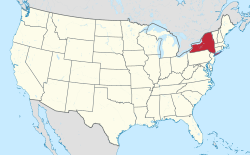Geography
According to the U.S. Census Bureau, the town has a total area of 44.59 square miles (115.5 km2), of which 43.25 square miles (112.0 km2) are land and 1.34 square miles (3.5 km2), or 3.01%, are water. The northern boundary of the town is Lake Ontario, and the western town line is the border of Orleans County, marked by New York State Route 272 (Monroe Orleans County Line Rd). The south town line borders the town of Clarkson, marked by Clarkson Hamlin Town Line Road that intersects Lake Road (New York State Route 19) south of Hamlin village. The eastern town line borders the town of Parma, marked by Hamlin-Parma Townline Road.
The Lake Ontario State Parkway passes across the north part of the town. The city of Rochester is 23 miles (37 km) to the southeast, and the village of Brockport is 6 miles (10 km) to the south.
Demographics
Historical population| Census | Pop. | Note | %± |
|---|
| 1860 | 2,460 | | — |
|---|
| 1870 | 2,304 | | −6.3% |
|---|
| 1880 | 2,556 | | 10.9% |
|---|
| 1890 | 2,338 | | −8.5% |
|---|
| 1900 | 2,183 | | −6.6% |
|---|
| 1910 | 2,184 | | 0.0% |
|---|
| 1920 | 1,999 | | −8.5% |
|---|
| 1930 | 2,079 | | 4.0% |
|---|
| 1940 | 2,080 | | 0.0% |
|---|
| 1950 | 2,321 | | 11.6% |
|---|
| 1960 | 2,755 | | 18.7% |
|---|
| 1970 | 4,167 | | 51.3% |
|---|
| 1980 | 7,675 | | 84.2% |
|---|
| 1990 | 9,203 | | 19.9% |
|---|
| 2000 | 9,355 | | 1.7% |
|---|
| 2010 | 9,045 | | −3.3% |
|---|
| 2020 | 8,725 | | −3.5% |
|---|
|
As of the census [7] of 2000, there were 9,355 people, 3,255 households, and 2,532 families residing in the town. The population density was 215.5 inhabitants per square mile (83.2/km2). There were 3,503 housing units at an average density of 80.7 per square mile (31.2/km2). The racial makeup of the town was 96.78% White, 1.09% African American, 0.35% Native American, 0.32% Asian, 0.01% Pacific Islander, 0.68% from other races, and 0.76% from two or more races. Hispanic or Latino of any race were 1.60% of the population.
There was a myth that Hamlin's name was derived from that of the German city of Hamelin, this due to the fact that many residents in or near the hamlet of Hamlin were descended from German immigrants who had arrived during the late 1800s and settled in that part of the town. This had coincided with the town's renaming from Union in 1861.
There were 3,255 households, out of which 43.4% had children under the age of 18 living with them, 63.7% were married couples living together, 9.6% had a female householder with no husband present, and 22.2% were non-families. 17.4% of all households were made up of individuals, and 5.9% had someone living alone who was 65 years of age or older. The average household size was 2.86 and the average family size was 3.24.
In the town, the population was spread out, with 30.8% under the age of 18, 8.1% from 18 to 24, 31.5% from 25 to 44, 23.0% from 45 to 64, and 6.5% who were 65 years of age or older. The median age was 34 years. For every 100 females, there were 98.5 males. For every 100 females age 18 and over, there were 97.0 males.
The median income for a household in the town was $49,987, and the median income for a family was $55,020. Males had a median income of $39,722 versus $24,698 for females. The per capita income for the town was $18,978. About 4.7% of families and 6.0% of the population were below the poverty line, including 6.4% of those under age 18 and 1.7% of those age 65 or over.
This page is based on this
Wikipedia article Text is available under the
CC BY-SA 4.0 license; additional terms may apply.
Images, videos and audio are available under their respective licenses.




